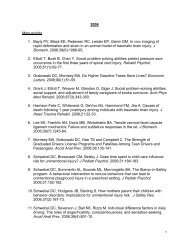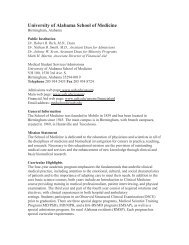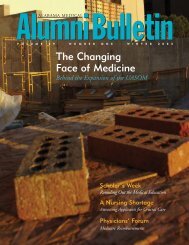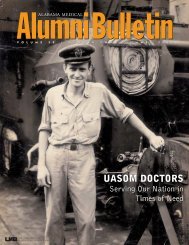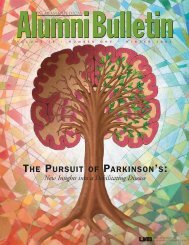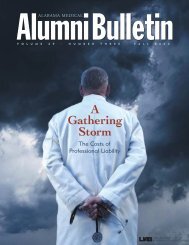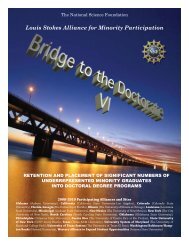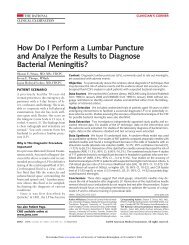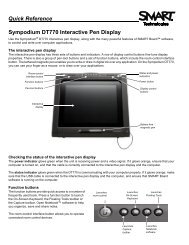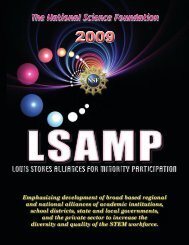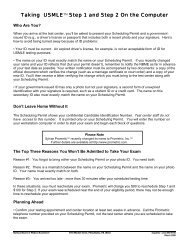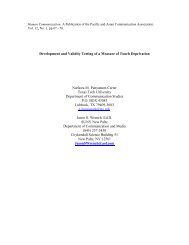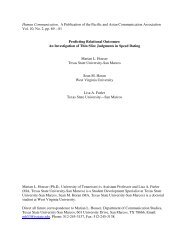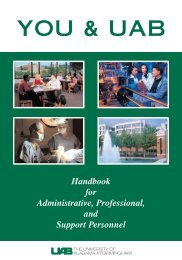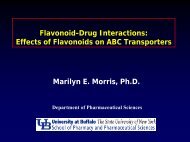In Pursuit of Precision - University of Alabama at Birmingham
In Pursuit of Precision - University of Alabama at Birmingham
In Pursuit of Precision - University of Alabama at Birmingham
You also want an ePaper? Increase the reach of your titles
YUMPU automatically turns print PDFs into web optimized ePapers that Google loves.
Fe<strong>at</strong>ure Stories<br />
According to Morgan, one <strong>of</strong> the gre<strong>at</strong>est<br />
benefits <strong>of</strong> the program is its support system.<br />
She says th<strong>at</strong> many students from rural areas<br />
feel out <strong>of</strong> place in the large university environment.<br />
They wonder if others will know wh<strong>at</strong> it<br />
feels like to be from a small town. “I developed<br />
a gre<strong>at</strong> group <strong>of</strong> colleagues and friends in the<br />
program,” she says. “I found other people with<br />
similar backgrounds and interests.” Also vital<br />
were the mentoring rel<strong>at</strong>ionships developed in<br />
the program. “It really helps to have mentors<br />
who are in primary care and who work especially<br />
in rural areas,” she says.<br />
QUALITY CARE<br />
AND COMMUNITY PRIDE<br />
The need for quality medical care in rural<br />
areas is as vital now as when the program was<br />
first conceived, says Linda Jackson. “Rural<br />
health needs in <strong>Alabama</strong> have grown to crisis<br />
proportions while rural educ<strong>at</strong>ion, economics,<br />
and social conditions have been depressed.”<br />
Thanks to the RMSP, many rural areas now<br />
have qualified medical practitioners with a<br />
true love <strong>of</strong> rural communities. “The communities<br />
where our gradu<strong>at</strong>es live and practice<br />
feel blessed by their presence,” she adds.<br />
Gradu<strong>at</strong>e Drake Lavender believes the program<br />
will have a lasting impact on medical care<br />
throughout the st<strong>at</strong>e <strong>of</strong> <strong>Alabama</strong>. Having<br />
grown up in a small community, he knows<br />
from personal experience the importance <strong>of</strong><br />
rural practitioners. “Medical care can affect<br />
every facet <strong>of</strong> life in a rural community,” he<br />
says. “Local medical care is key to the overall<br />
health <strong>of</strong> a community, because people <strong>of</strong>ten<br />
have no access to transport<strong>at</strong>ion. Economically,<br />
a doctor in town can mean a gre<strong>at</strong> influx <strong>of</strong><br />
money and jobs into the community, both<br />
directly—through doctor’s <strong>of</strong>fices, pharmacies,<br />
and hospitals—and indirectly, through companies<br />
th<strong>at</strong> will only enter the area if adequ<strong>at</strong>e<br />
medical care is available. Socially, some studies<br />
have shown th<strong>at</strong> having adequ<strong>at</strong>e medical care<br />
increases the residents’ pride in a community.”<br />
Taking their knowledge to rural areas, gradu<strong>at</strong>es<br />
<strong>of</strong> the program will help to cre<strong>at</strong>e a<br />
much-needed service and build a new sense <strong>of</strong><br />
community pride. Th<strong>at</strong>, says everyone<br />
involved, is <strong>at</strong> the heart <strong>of</strong> the Rural Medical<br />
Scholars Program.<br />
A Handful<br />
<strong>of</strong> Memories<br />
George Hand’s<br />
Retirement: A<br />
Reason to Reminisce<br />
By Roger Shuler<br />
At a skit night a few years ago,<br />
UASOM students cre<strong>at</strong>ed a character<br />
called “Minutia George.” They even<br />
wrote a song about him. Out in the audience,<br />
George S. Hand, Jr., Ph.D., knew<br />
immedi<strong>at</strong>ely whom the students were<br />
referring to, and he could not help but<br />
join in the laughter.<br />
After all, the skit was a sign th<strong>at</strong> Hand<br />
had done his job well. For most <strong>of</strong> his<br />
career <strong>at</strong> the UASOM, Hand taught the first-year course in medical histology. “It’s the<br />
study <strong>of</strong> the human body <strong>at</strong> the microscopic level,” he says. “Medical students have to<br />
learn the normal microstructure <strong>of</strong> the body before they can understand p<strong>at</strong>hology.<br />
Medical histology complements the gross an<strong>at</strong>omy course: <strong>In</strong> gross an<strong>at</strong>omy, you dissect<br />
with the hands; in medical histology, you dissect with the eyes.” Hand has taught every<br />
student <strong>at</strong> the UASOM since 1974.<br />
Hand grew up in Perryville, Missouri, but he looks back fondly on his career<br />
in <strong>Birmingham</strong>. “I’ve gone to n<strong>at</strong>ional meetings and had people poke fun <strong>at</strong> my<br />
now-Southern accent,” he says. “But when people look <strong>at</strong> your name badge and<br />
see ‘<strong>University</strong> <strong>of</strong> <strong>Alabama</strong> School <strong>of</strong> Medicine,’ you get instant respect. No one<br />
pokes fun <strong>at</strong> th<strong>at</strong>.”<br />
Hand retired last September, after 32 years <strong>at</strong> the UASOM. He helped form the<br />
UASOM Committee on Admissions in 1979, and he served as associ<strong>at</strong>e director <strong>of</strong><br />
admissions in from 1985 to 1988, director <strong>of</strong> admissions from 1988 to 1996, and assistant<br />
dean from 1996 until his retirement in 2001. He continues to serve as an admissions<br />
consultant, and he still teaches a medical cell and tissue biology course.<br />
“It’s a joy to work with medical students,” Hand says. “I’ve worked with some <strong>of</strong> the<br />
finest and brightest young men and women in the country, and it’s a joy to be an instrument<br />
in their learning.”<br />
The George Hand Scholarship Fund<br />
To honor the contributions <strong>of</strong> George S. Hand, Jr., Ph.D., alumni <strong>of</strong> UASOM<br />
and friends and colleagues have have cre<strong>at</strong>ed an endowed scholarship to<br />
encourage and assist medical students from rural, underrepresented areas.<br />
The scholarship will award about $500 to one student per year, to be applied<br />
to the student’s tuition and fees. The first scholarship is expected to be<br />
<strong>of</strong>fered in 2002. To contribute to the fund, or for more inform<strong>at</strong>ion, contact<br />
John Lankford <strong>at</strong> (205) 975-7341.<br />
13



